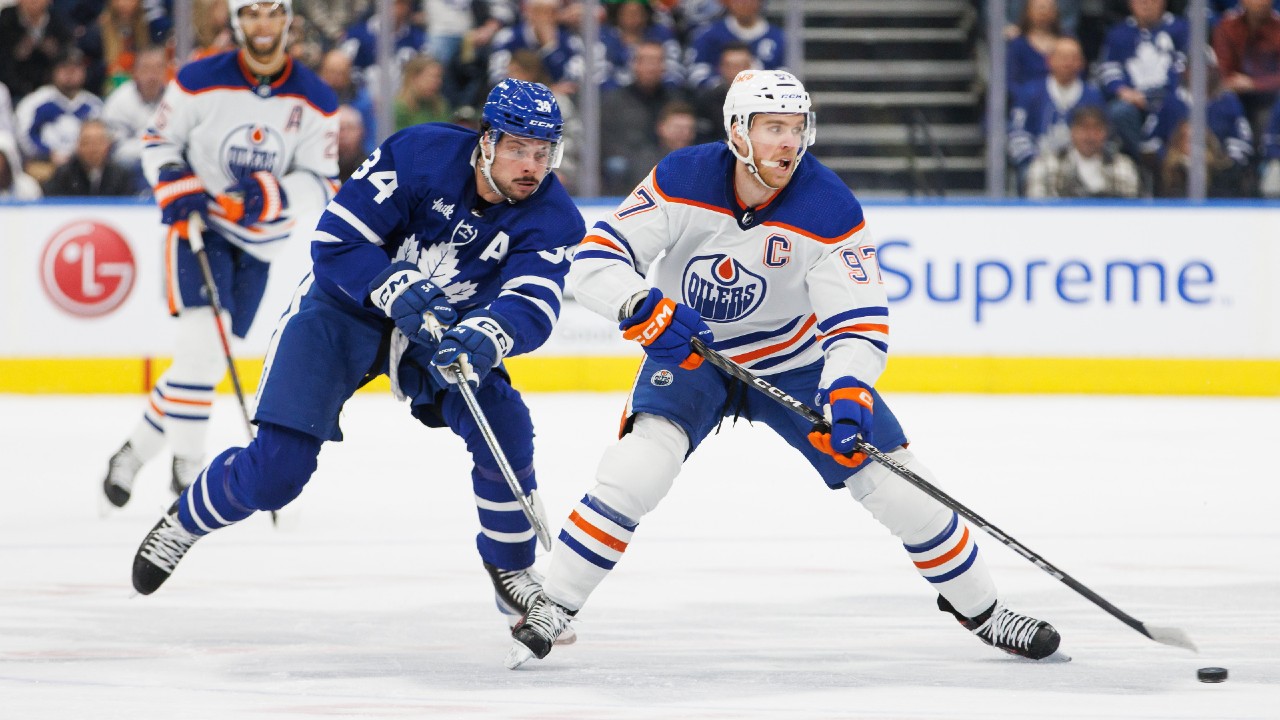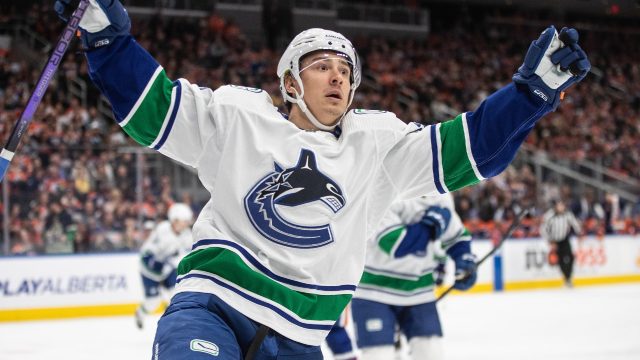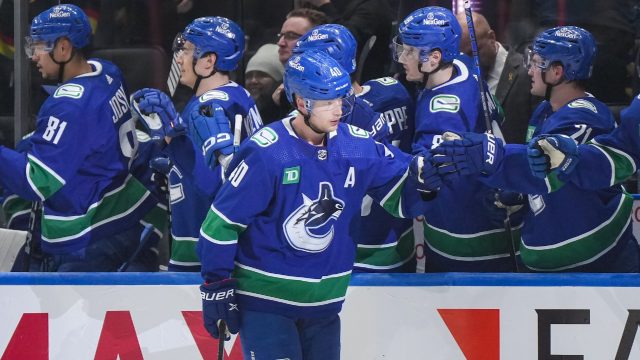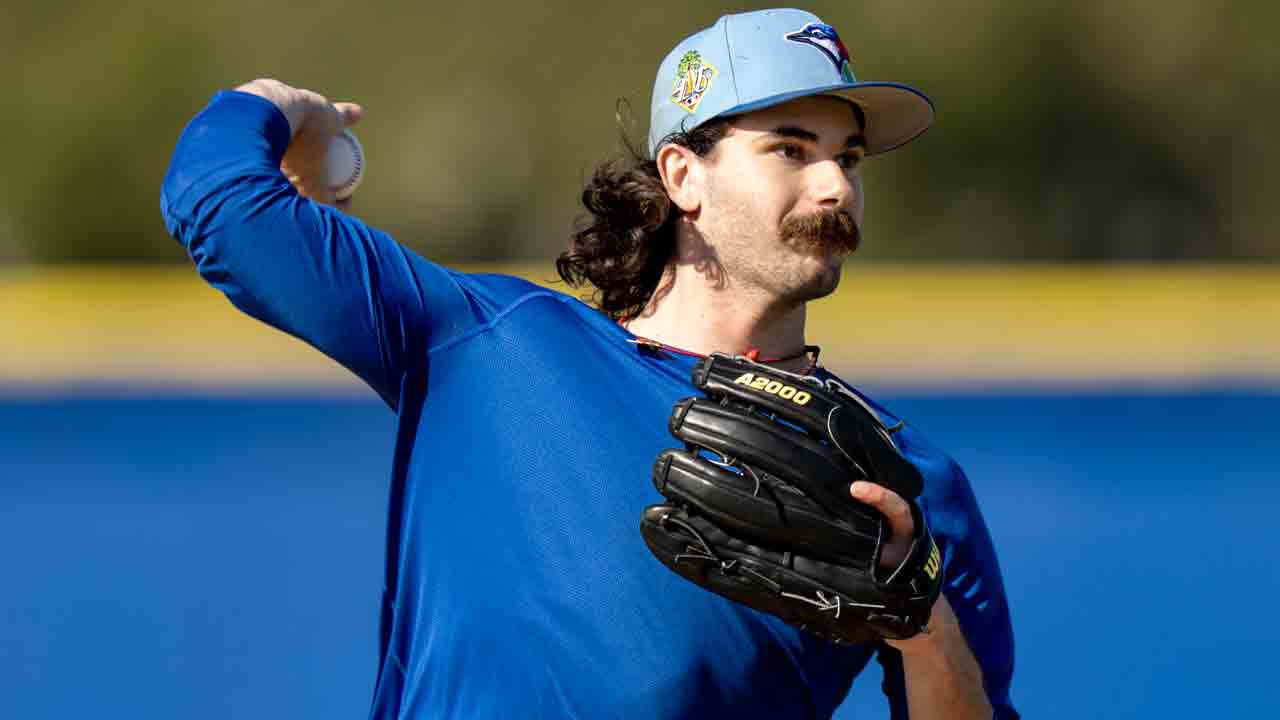
VANCOUVER — Time flies when you’re having fun. Or even when you’re not.
Jim Rutherford said being president of a National Hockey League team is not a fun job, but can be an enjoyable one, a rewarding one. After a tumultuous first season and a half in charge of the Vancouver Canucks, when the 74-year-old Hall-of-Famer oversaw the complete reconstruction of the hockey operations department and, last winter, a messy coaching change, Rutherford has been mostly quiet this season as his surprising team built an 18-9-1 start.
In his only press conference, on the eve of training camp, Rutherford said the Canucks could be a playoff team “if everything goes right.” Most things have, but not everything. But as the Tampa Bay Lightning visit Rogers Arena on Tuesday night, the Canucks sure look like a playoff team.
It was two years ago this week that Rutherford agreed to come out of retirement after a five-hour visit to his home in Raleigh, N.C., by Canucks owner Francesco Aquilini. He accepted a two-and-half-year contract to rebuild the team, and with two-thirds of this season remaining, the Canucks have undergone a remarkable transformation.
Not fun, Rutherford said. But enjoyable enough that he plans to keep going. In a sitdown interview with Sportsnet, he spoke about the last two years and this season.
Sportsnet: How would you characterize the last two years?
Jim Rutherford: Well, nothing surprises me because, of course, I’ve been around a long time. I’ve seen a lot of things. Obviously, we dealt with some things that we weren’t expecting and we ended up making a lot of changes within hockey operations. Those are not comfortable. You know, you’re dealing with people’s lives and good people. But in order to make the changes and get everybody on the same path, that was something we had to do. So that was difficult. But the time has gone by pretty quick.
SN: Have you talked to your boss about a new contract?
JR: Is that my wife or son or daughter? Oh, my owner. We don’t view each other as bosses, but we do make decisions as a family, so that’s important. Francesco and I, we communicate on a regular basis. So, yeah, we’ve had some conversations about it.
SN: You hired general manager Patrik Allvin the month after you arrived, then 12 months later hired Rick Tocchet as coach. Along the way you built a new hockey-ops department. How much of the team’s turnaround is due to organizational alignment?
JR: You have to have alignment in your hockey operations, but alignment doesn’t mean (you can’t have) different ideas or long debates about different things that people don’t agree on. That’s really important. But as far as alignment, from ownership, to Patrik, to the coaches, to the players, to player development and scouting and everything else, our alignment is very strong.
SN: Do you wish you’d achieved it sooner?
JR: Well, yes. That’s an obvious answer. But based on the circumstances… Francesco had hired Bruce (Boudreau) just prior to me coming. But he did call me about him. Bruce was the right guy at that point in time to get the players motivated, and get them back on track. And he did that.
SN: Your new coach appears to have established the accountability and standards you wanted. Do you worry Tocchet has been too honest at times with criticism of his team and individual players, including Andrei Kuzmenko recently?
JR: Rick is consistent with his constructive criticism. He doesn’t just pick a lower-end guy, for example. It’s consistent with how he feels at the time, and I think that’s fair to the players. He makes the players accountable, his expectations are high, and I really like the way he works.
SN: Were you trying to undersell your team or mute expectations when you said in September that everything had to go right for the Canucks to make the playoffs?
JR: We’re only partway into the season. This is a marathon race — a season schedule. I’ll say the same thing: everything has to go right. But the biggest thing we’ve accomplished to this point is the coach has put a plan in place, the players have worked hard and bought into it, and now they’ve proven to themselves what they can do.
SN: Have the last two months accelerated your plans to win? Are you closer to a winning window than you thought you would be?
JR: We’re closer. But if you remember the first press conference when I came here, I said there’s players here that are better than people think, and probably a lot better than they think. And once we got to the point that our plan was put in place and the system was put in place, and the players bought into it and realized playing a certain way they could have success, you saw how good these players could be. I actually view the window as just starting to open up because our top players are playing the way they’re capable of. But we now also have a good pipeline of players coming, and if those players hit the way we think they’re going to hit here in the next couple of years, and you have Quinn Hughes (24) and Elias Pettersson (25) at the age they are, and I believe J.T. Miller (30) is going to be a good player for a long time, and we have Thatcher Demko (28) at a good age, that window could actually open bigger.
SN: Is Elias Pettersson’s price going up by the month?
JR: I don’t know the answer to that.
SN: Elliotte Friedman reported that your GM sat down with Pettersson during a recent road trip, just to check in. Has there been any progress in contract negotiations since Pettersson declared before the season that he wanted to wait before re-signing?
JR: I feel positive about the situation. That’s about all I can say at this point.
SN: So you think Pettersson wants to stay with the Canucks?
JR: We have not had any indication otherwise.
SN: Do you also feel positive about Kuzmenko, who is struggling to adapt to meet Tocchet’s demands?
JR: I’m concerned only to the point that now he’s feeling the pressure. And when you feel the pressure and you start pushing, squeezing the stick harder and passing when you should be shooting and vice versa, you get a little bit concerned. I believe in the staff we have and they will continue to work with him. He’s a good player. He is a capable player. Is he a guy that’s going to score 40 goals again? Maybe not. But certainly the way he plays, you should be able to project him at 25.
SN: There is growing trade speculation about Kuzmenko. Will you be patient and let him work through his problems in Vancouver?
JR: Well, we’ll keep an open mind. I don’t want to just lock ourselves into one answer. But we need to continue to try to help.
SN: There’s the old saying that nobody bats 1,000. But you bought out Oliver Ekman-Larsson in the summer and reinvested the savings in free agents Ian Cole, Carson Soucy, Teddy Blueger and Pius Suter. You traded Tanner Pearson for Casey DeSmith, a fifth-round pick for Sam Lafferty, and offloaded Anthony Beauvillier so you could add Nikita Zadorov. Isn’t that close to batting 1,000?
JR: You never bat a 1,000. If you’re not making mistakes, you’re not being aggressive enough to do your job. But make sure you limit your mistakes, make good moves, and when you make your mistakes, try not to make them over and over again. We’ve been fairly patient. The Ekman-Larsson buyout was a tough decision because we recognize he’s a good player. But at what we had to pay him this year and next year, the investment didn’t make sense. And if we didn’t buy him out, we wouldn’t have been able to do some of the things we did to change the team. And if we’d come back with the same team, well, it would have been the same team.
SN: Who deserves the credit for the home runs on DeSmith and Lafferty?
JR: It’s a process. We want the pro scouts to identify players. And Patrik and I are identifying players on a daily basis. And then when those players are identified, it gets run through analytics. And then we go to the pro scouting reports. And then, of course, a big part is: What do they make? How do they fit into the cap? And where are they going to fit into the team? You know, we waited a long time on Suter because at one point in time, I think he was maybe looking for $3 million (per season). We waited and waited until the time that number came down (to $1.6 million for this season and next) and it fit for us. So it’s a little game of chess, a little game of poker you’re playing, hoping nobody else jumps in. Ultimately, Patrik’s got to make a decision.
SN: You added a reliable defenceman in Zadorov. Do you still need to add another?
JR: Well, you can never have enough defencemen. You can ask every team that. I will say that we’re really pleased with the development of (Noah) Juulsen. Same with any position, we’re going to keep looking to see if there’s anywhere that we can upgrade.
SN: Will you be aggressive before the trade deadline?
JR: We’ll see how the team plays and how everybody plays and where our needs are. I don’t know if ‘aggressive’ is the right word. But we’ll continue to look at anywhere we can improve the team.







